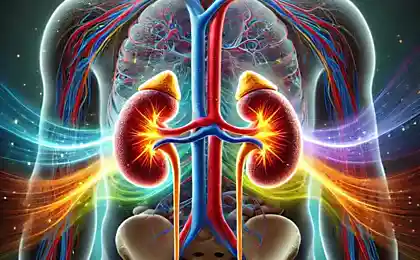162
Adrenaline fatigue: how to cope with burnout

Introduction. Chronic lack of sleep, a constant feeling of fatigue, apathy and a lack of desire to do even your favorite things - all this can be signs of a condition that experts call adrenaline fatigue. This phenomenon is associated with an overload of our hormonal system, especially the adrenal glands responsible for the production of cortisol and adrenaline. Let’s figure out why this happens and how to help your body get back to balance.
What is adrenaline fatigue?
Adrenaline fatigue is a condition that results from prolonged exposure to stress on the body. Under the influence of stress, the adrenal glands begin to intensively produce stress hormones such as cortisol and adrenaline. These hormones help us cope with short-term stressful situations, but their excess over time leads to depletion of the body’s resources.
Main symptoms:
- Constant fatigue, which does not go away even after a long rest.
- Decreased concentration and memory.
- Frequent mood swings, irritability or apathy.
- Drinking more caffeine or sugar to boost energy
- Decreased immunity, frequent colds.
Why does adrenaline fatigue occur?
The reasons for this condition lie in the modern way of life. Here are the main factors:
- Chronic stress. Constant stress at work, in the family or at home overloads our nervous system.
- Lack of sleep. Lack of quality sleep prevents the body from recovering.
- Poor nutrition. Eating large amounts of sugar, caffeine and processed foods worsens the adrenal glands.
- Lack of physical activity. Movement helps reduce stress hormone levels and improve overall well-being.
How to deal with adrenaline fatigue?
Fortunately, there are many ways to help the body regain balance. Here are some practical recommendations:
1. Normalize sleep patterns
Try to go to bed and get up at the same time. Make sure that your bedroom is comfortable: darkened curtains, no gadgets before bedtime and a comfortable mattress are the key to quality rest.
2. Rethink your diet.
Eliminate processed foods, add more vegetables, fruits, whole grains and proteins. Pay special attention to foods rich in magnesium, B vitamins and vitamin C, which support the adrenal glands.
3. Reduce your consumption of stimulants
Minimize the consumption of coffee, energy drinks and sweets. These products give a short-term burst of energy, but in the long run worsen the condition.
4. Practice relaxation.
Meditation, breathing practices, yoga and nature walks help reduce stress levels and harmonize the nervous system.

5. Play sports regularly
Moderate physical activity, such as walking, swimming or stretching, helps lower cortisol levels and improves overall well-being.
Conclusion
Adrenaline fatigue is the body’s signal that it needs support. It is important to learn to listen to your body and take steps to restore balance. Regular sleep, proper nutrition, moderate physical activity and stress management will help you regain the energy and joy of life. Remember, taking care of your health is an investment in your future.
How to Lower Stress Hormone: 16 Ways to Be Happy
Mental health: how to understand that there are problems























